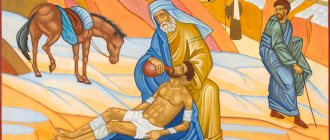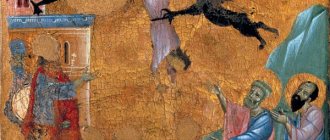A selection of Orthodox parables for those seeking wisdom
According to St. Basil the Great, the word “Parable” comes from the word “to flow” - “to come” and means a short instructive story, a traveling saying that serves as a signpost, guides a person along the paths of life, giving him the means to prosper along these paths.
We present to our readers the delight of the sages - a selection of Christian parables that will help them understand their faith and correctly build their spiritual life:
1. Novice and elder
One day, an old monk and a young novice were returning to their monastery. Their path was crossed by a river, which, due to the rains, overflowed very heavily. On the shore stood a young woman who also needed to move to the opposite shore, but she could not do it without outside help.
The vow strictly forbade monks to touch women, and the novice pointedly turned away from her. The elder approached the woman, took her in his arms and carried her across the river.
The companions remained silent the rest of the way, but at the monastery itself the young novice, condemning, turned to his experienced brother: “How could you touch a woman!? You made a vow! Will you really be able to calmly enter the gates of our monastery after this?”
The elder replied: “It’s strange, after carrying the woman, I left her there, by the stream, but you still carry her with you - in your heart and thoughts.”
2. Mind or heart?
One elder asked another:
- In your opinion, brother, what is better to follow, the mind or the heart?
“To the heart,” he answers.
- On what basis?
- On the simple basis that the heart shows us our duty, and the mind provides reasons to shirk its fulfillment.
3. Passion
One day, two young men came to one holy elder and asked: “Tell us, father, how to properly deal with bad inclinations and eradicate bad habits?”
To this the hermit said to one of the young men: “Pull out this sprout.” The bush was tiny, and the young man pulled it out easily, with one hand.
After this, the elder said again: “My friend, now pull out this tree.” The young man did this too, but with difficulty and effort: the bush was much taller and stronger than the first.
Then the elder said for the third time: “Now try to pull out this tree.” The young man hugged his trunk and tried to fulfill the command, but in vain. He called his brother, and the two of them tried to at least shake the tree, but in vain. The tree is deeply rooted in the ground.
Then the elder said to the brothers: “My children, evil inclinations and habits are like these trees. If they are not yet deeply rooted in our hearts, then a strong will alone is enough to destroy them. But once they have grown stronger and taken root, it is almost impossible to deal with them. Eradicate the bad in yourself before it develops into something more.”
4. Different students
One elder had a student who was distinguished by obedience and at the same time was a good scribe. The elder loved him for his obedience. The elder also had eleven other disciples, and they began to grieve that the elder loved the scribe more than them.
Hearing their murmur, the other elders began to reproach the Abba. Then he led them to the cells of his disciples.
- Brother! Come here quickly! “I need you,” Abba repeated, knocking on each door in turn.
But none of the students was in a hurry to open it to him: some were singing psalms at that moment and did not want to stop, another was weaving ropes and was afraid of ruining his needlework because of his haste.
Finally, it was the scribe's turn. Ava just knocked quietly on the door and called his name. At that same moment the door swung open, and a monk appeared on the threshold with a pen in his hand.
- Tell me, fathers, where do you see my other students? - Abba asked.
Then he entered the cell, took the notebook and saw that the student had just begun to write a new letter, but ran to open it for the teacher without even finishing it.
Then the elders said:
“You love him rightly, Abba.” And we all love him, and God loves him.
5. Condemnation
One married couple moved to a new apartment. In the morning, the wife looked out the window and, seeing a neighbor hanging out the washed laundry, said to her husband:
“Look at how dirty her linen is, she probably doesn’t know how to wash.”
This happened every time the neighbor hung out the laundry, the wife was surprised at how dirty it was. One day, waking up and looking out the window, she exclaimed:
- The laundry is clean today! ...Finally, the neighbor learned how to do laundry.
“No,” said the husband, “I just got up early today and washed your glass...
6. Know how to rejoice
One woman had two sons. The older man was selling umbrellas. The younger one dyed fabrics. When the sun was shining, no one bought umbrellas from the eldest son, and when it rained, the youngest son’s fabrics did not dry. This made the woman very sad, and her life became sad.
One day she met a wise man and he gave her advice. From then on, when the sun was shining, she was happy for her youngest son, who successfully dried his fabrics, and when it rained, she was happy for the eldest, from whom everyone bought umbrellas. And life got better.
7. Heaven and Hell
One Monk really wanted to know what Heaven is and what Hell is, he prayed to God to best understand this and thought for a long time.
One day, when he fell asleep during his painful thoughts, he had a dream that he was in Hell.
The monk looked around and saw: people sitting in front of cauldrons with food. Everyone is exhausted and hungry. Everyone has a spoon with a long handle in their hands. Each person easily scoops them out of the cauldron, but cannot get them into his mouth with a spoon - the length of the handle is longer than the length of his arm.
Suddenly the picture changes and the monk finds himself in Paradise. And there everything is the same - people with spoons on long handles sit near cauldrons of stew, but their faces beam with happiness!
The monk took a closer look and understood why: the inhabitants of paradise fed each other...
8. About respect for elders
In one family there lived a very old man. His eyes were blinded, his hearing was dull, his knees trembled. He could hardly hold a spoon in his hands and while eating he often spilled soup on the tablecloth, and sometimes some of the food fell out of his mouth.
The son and his wife were very irritated by the sight of the infirmity of their elderly parent and during meals they began to sit him in a corner behind the stove, and the food was served to him in an old saucer... From there the old man sadly looked at the beautifully set rich table, and his eyes became moist.
One day he was so nervous that he could not hold the saucer with food, it fell to the floor and broke. The young housewife began to scold the elderly father of the family, and he silently endured the insults, sighing bitterly.
Later, the wife persuaded her husband to buy his father a cheap wooden bowl. Now he had to eat from it.
One day, when the parents were sitting at the table, their four-year-old son entered the room with a wooden block in his hands.
- What do you want to do? - asked the father.
“A wooden trough,” answered the kid. You will eat from it when I grow up!
The child’s answer so amazed the father and mother that they fell to their knees in front of their elderly father and apologized for their disrespect.
9. Pots
A monk once came to his mentor and said:
- Father, how many times have I come to you, repenting of my sins, how many times have you instructed me with advice, but I cannot improve. What good is it for me to come to you if after our conversations I again fall into my sins?
Avva replied:
- My son, take two clay pots - one with honey and the other empty.
The student did just that.
“Now,” said the teacher, “pour the honey several times from one pot to another.”
The student obeyed again...
“Now, son, look at the empty pot and smell it.”
The student looked, smelled and said:
- Father, the empty pot smells of honey, and there, at the bottom, there is a little thick honey left.
“That’s it,” said the teacher, “and my instructions settle in your soul.” If for the sake of Christ you learn at least part of the virtues in life, then the Lord, by His mercy, will make up for their lack and save your soul for life in paradise. For even an earthly housewife does not pour pepper into a pot that smells of honey. So God will not reject you if you retain at least the beginnings of righteousness in your soul!
10. Difficult moments
One day a man had a dream. He dreamed that he was walking along a sandy shore, and next to him was the Lord. Pictures from his life flashed in the sky, and after each of them he noticed two chains of footprints in the sand: one from his feet, the other from the feet of the Lord.
When the last picture of his life flashed before him, he looked back at the footprints in the sand. And he saw that often along his life’s path there was only one chain of traces. He also noticed that these were the most difficult and unhappy times in his life...
Then he became greatly saddened and began to murmur against the Lord:
“Didn’t You tell me: if I follow Your path, You will not leave me.” But I noticed that during the most difficult times of my life, only one chain of footprints stretched across the sand. Why did You abandon me when I needed You most?
The Lord replied:
- My son! I love you very much and will never leave you. When there were sorrows and trials in your life, only one chain of footprints stretched along the road. But this is because then I carried you in my arms...
Andrey Szegeda
You can applaud the author (at least 10 times)464
Genre features of the parable
Most often, a parable is a short narrative work of moral teaching with a ring composition. It uses allegorical plots from everyday life and abstract images. The characters in the parable are conventional. Their characters and development, as well as the place and time of action, are not outlined. Even the plot in a parable is optional. Its task is not to describe events or phenomena, but only to report them and use them to explain spiritual truths. Using simple and recognizable imagery, parables are often more effective than lengthy theological treatises.
Parables have a philosophical or religious aspect. They talk about truth and lies, good and evil, life and death, man and God. A parable is sometimes difficult to understand without context, since its meaning is determined by the reason for which it is told. In works of this genre, there is often no explanation of allegories, which makes them like riddles. At the same time, gospel parables are always accompanied by interpretation.
Proverbs of Solomon
Solomon is an Israeli king and prophet who lived a thousand years before Christ, the heir of King David, who was also a prophet. Solomon is considered the author of several Old Testament books, including the Proverbs of Solomon. It was written under the inspiration of the Holy Spirit and is a religious and poetic collection of teachings, reasoning and everyday rules of the pious king. Jews and Christians see Solomon as a model of Old Testament wisdom. Here are some of his teachings.
“The Lord will not allow the soul of the righteous to suffer hunger, but He will snatch away the wealth of the wicked” (Prov. 10:3).
As in many other verses in the book, Solomon contrasts the righteous and the sinner. The author points out that the just Lord will never leave a person who tries to live in accordance with God's Commandments. At the same time, it is said that people who are wicked in heart will be cut off from God. He will thwart their evil intentions.
“Whoever mocks a beggar blasphemes his Creator; whoever rejoices in misfortune will not go unpunished [but the merciful will receive mercy]” (Prov. 17:5).
With this verse, Solomon teaches that every person, regardless of his social status, is an image of the Creator who created him. Therefore, blasphemy against your neighbor is also blasphemy against God. By offending another person, we trample on the sacred principle inherent in him. The author notes that the Almighty does not leave this unpunished. Other spiritual parables of Solomon contain similar thoughts:
“Whoever oppresses the poor blasphemes his Creator; but he who honors Him does good to the needy” (Prov. 14:31).
Is it possible to divide the parables of Jesus Christ by time?
Yes, the parables of Jesus Christ can be divided according to the three periods of His public ministry.
The first group includes parables told by the Savior shortly after the Sermon on the Mount, during the period between the second and third Easter of His public ministry. These initial parables speak about the conditions for the spread and strengthening of the Kingdom of God or the Church among people. These include the parables of the sower, the tares, the invisibly growing seed, the mustard seed, the pearl of great price, and others.
The second group of parables was told by the Lord towards the end of the third year of His public ministry. In these parables, the Lord spoke about God’s endless mercy towards repentant people and outlined various moral rules. These include the parables of the lost sheep, the prodigal son, the unmerciful debtor, the good Samaritan, the foolish rich man, the wise builder, the unjust judge, and others.
In His last parables ( of the third period) , told shortly before the sufferings on the cross, the Lord speaks about the Grace of God and about man’s responsibility before God, and also predicts about the punishment that will befall unbelieving Jews, about His second coming, about the Last Judgment, about the reward of the righteous and about eternal life. This last group includes parables about the barren fig tree, about the evil husbandmen, about those called to the supper, about the talents, about the ten virgins, about the workers who received equal pay, and others.
Parable 8. Why do you pray?
“Residents of one of the arid places gathered in the temple to pray for rain. And only one person showed up with an umbrella. Seeing this, people began to laugh at him: “Why did you bring an umbrella?” It won't rain. - Why are you praying then? - he answered.”
“Animals of Burma: bear, unicorn, wild ass, baby elephant” miniature 15th century.
Proverb 3. Stop bowing low
“The young man asked the old man: “I heard that in the past, in the good old days, God used to walk the earth, greet people, call them by name. Why don't we see it today? And where is he now? “The Lord is still where he was before,” the elder answered him, “only people have stopped bending so low to see God.”
“Moving to Moscow of Maxim the Greek” miniature 16th century (left); “The Journey of Metropolitan Pimen to Constantinople” miniature 16th century (right).
Did Jesus Himself explain why He chose an allegorical form for His sermon?
The Savior Himself explained why He taught in parables: to give an understanding of the truth to those who believe, and to hide it from those who do not believe: “And the disciples came and said to Him: Why do you speak to them in parables? He answered them: because it has been given to you to know the secrets of the Kingdom of Heaven, but it has not been given to them, for whoever has, more will be given to him and he will have an increase, and whoever does not have, even what he has will be taken away from him; Therefore I speak to them in parables, because seeing they do not see, and hearing they do not hear, and they do not understand” (Matthew 13:10-13, see also Mark 4:10-12).
Proverbs 5. Great Lent. Neophyte's Mistakes (2018)
It was not easy for the main character of the film series “Proverbs” to become a novice: his first spiritual exploits were unreasonable and often daring. That is why they don’t immediately become a monk, but in the monastery they are given simple obedience - to work.
He just recently came to the monastery. His love for God is so ardent that our hero takes on everything at once. It is at this time that converts make mistakes.
But the support of a wise mentor helps the neophyte realize and correct his mistakes...
Did the Old Testament say that Christ would teach in parables?
Yes, that in the Old Testament it was foretold that Jesus Christ would teach in parables [Ps. 77:2]: “I will open my mouth in a parable and speak fortune-telling from ancient times.” Saint Athanasius the Great writes in his interpretation of this verse [Ps. 77:2] as follows: “The Evangelist [Matthew] clearly explained [Matthew 13:35] that this was fulfilled when the Lord spoke many parables in the Gospels.” It should also be noted that although parables were known back in Old Testament times, they received special perfection and beauty in the mouth of the God-man.









